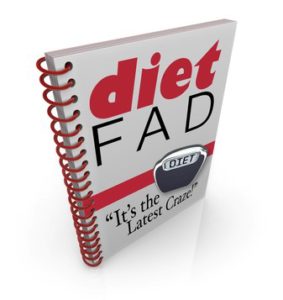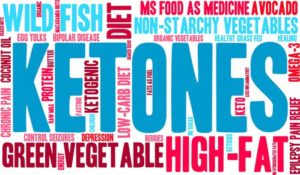Is The Ketogenic Diet Effective?
Author: Dr. Stephen Chaney
 The ketogenic diet has been around for a while. It has been used to control epilepsy in children since the 1920s. Nobody is quite sure why it helps control epilepsy, but it does. Once a mainstay of therapy, it is now primarily used as an adjunct to anti-epileptic drugs.
The ketogenic diet has been around for a while. It has been used to control epilepsy in children since the 1920s. Nobody is quite sure why it helps control epilepsy, but it does. Once a mainstay of therapy, it is now primarily used as an adjunct to anti-epileptic drugs.
However, recently the ketogenic diet has gone mainstream. It’s no longer just for epilepsy. It has become the latest diet fad. If you believe the claims:
- Hunger and food cravings will disappear. The pounds will melt away effortlessly and rapidly.
- You will feel great. You’ll have greater mental focus and increased energy.
- Physical endurance will increase. You’ll become superhuman.
- Type 2 diabetes will disappear.
- Your blood sugar, cholesterol, and triglyceride levels will improve, reducing your risk of developing diabetes and heart disease.
What’s not to like? This sounds like the perfect diet. But, are these claims true? More importantly, is this diet safe?
What Is Ketosis?
 Ketosis is a natural metabolic adaptation to starvation. To better understand that statement let me start with a little of what I’ll call metabolism 101.
Ketosis is a natural metabolic adaptation to starvation. To better understand that statement let me start with a little of what I’ll call metabolism 101.
Metabolism 101:
The Fed State: Here’s what happens to the carbohydrate, protein & fat we eat in a meal.
- Most carbohydrates are converted to blood sugar (glucose), which is utilized in three ways:
- Most tissues use glucose as their primary energy source in the fed state.
- Excess glucose is stored as glycogen in muscle and liver.
- Glycogen stores are limited, so much of the excess glucose is stored as fat.
- A few tissues such as heart muscle use fat as an energy source. Excess fat is stored.
- Protein is also used in three ways:
- Some of it is used to replace and repair the protein components in muscle and other tissues.
- In conjunction with exercise, protein can be used to increase muscle mass.
- Excess protein is converted to fat and stored.
The Fasting State: Between meals:
- Most tissues switch to fats as their primary energy source. Fat stores are utilized to fuel the cells that can use fat.
- Brain, red blood cells, and a few other tissues still rely solely on glucose as their energy source.
- Liver glycogen stores are broken down to keep blood glucose levels constant and provide energy for these tissues. (Muscle glycogen stores are reserved for high intensity exercise).
- As liver glycogen stores are depleted, the body starts breaking down protein and converting it to glucose.
 Starvation – The Problem: If the fasting state were to continue for more than a few days, we enter what is called starvation. At this point we have a serious problem. Fat stores and carbohydrate stores (liver glycogen) exist for the sole purpose of providing fuel during the fasting state. Protein, however, is unique. There are no separate protein stores in the body. All protein in our body is serving essential functions.
Starvation – The Problem: If the fasting state were to continue for more than a few days, we enter what is called starvation. At this point we have a serious problem. Fat stores and carbohydrate stores (liver glycogen) exist for the sole purpose of providing fuel during the fasting state. Protein, however, is unique. There are no separate protein stores in the body. All protein in our body is serving essential functions.
To make matters worse, our brain is metabolically very active. It consumes glucose at an alarming rate. Thus, large amounts of glucose are needed even in the fasting state. If protein continued to be converted to glucose at the same rate as during an overnight fast, our essential protein reserves would rapidly be depleted. Irreversible damage to heart muscle and other essential organs would occur. We would be dead in a few weeks.
Starvation – The Solution: Fortunately, at this point a miraculous adaptation occurs. Our bodies start to convert some of the fat to ketones.
- All tissues that use fat as an energy source during fasting can also use ketones as an energy source, sometimes with greater efficiency.
- Over a period of several days, the brain adapts to ketones as its primary energy source. This greatly reduces the depletion of cellular protein to supply blood glucose.
- However, red blood cells and a few other cells still require glucose as an energy source. Essential protein reserves are still being depleted, but at a far slower pace.
- With these adaptations, humans can survive months without food if necessary.
There are a few other adaptations that make sense if we think about the dilemma of going long periods without food.
- Appetite decreases.
- Metabolic rate decreases, which helps preserve both protein & fat stores.
What Is The Ketogenic Diet?
 Proponents of the ketogenic diet advocate achieving a permanent state of ketosis without starving yourself. That is achievable because the real trigger for ketosis is low blood sugar, not starvation.
Proponents of the ketogenic diet advocate achieving a permanent state of ketosis without starving yourself. That is achievable because the real trigger for ketosis is low blood sugar, not starvation.
The starting point for the ketogenic diet is low-carb, high-fat diets like Atkins. However, ketogenic diets go beyond traditional low-carb, high-fat diets. They restrict carbohydrates even further to <10% of calories so that a permanent state of ketosis can be achieved. Basically, the ketogenic diet:
- Eliminates grains and sugars.
- Eliminates most fruits.
- Eliminates starchy vegetables (root vegetables, corn, peas, beans, squash & yams).
- Reduces protein intake. That’s because dietary protein will be converted to glucose when blood glucose levels are low.
You are left with a highly restrictive diet that allows unlimited amounts of fats & some vegetables and moderate amounts of meats, eggs, and cheeses.
The Ketogenic Diet Is Not For Wimps
 #1: You have to be committed. As noted above, this is a highly restrictive diet. You will have great difficulty following it when you eat out or are invited to a friend’s house for dinner. You will also have to give up many of your favorite foods.
#1: You have to be committed. As noted above, this is a highly restrictive diet. You will have great difficulty following it when you eat out or are invited to a friend’s house for dinner. You will also have to give up many of your favorite foods.
#2: The transition is rough. Physiological adaptation to the ketogenic diet will take anywhere from a couple of days to a week or two. During that time, you will have to endure some of the following:
- Headaches, confusion & “brain fog”
- Fatigue
- Hunger
- Lightheadedness and shakiness
- Leg cramps
- Constipation
- Bad breath
- Heart palpitations
#3: There are no “cheat days”. On most diets, you can have occasional “cheat days” or sneak in some of your favorite foods from time to time. The ketogenic diet is different. A single “cheat day” is enough to take you out of ketosis. If you want to resume the ketogenic diet, you will need to go through the transition period once again.
Is The Ketogenic Diet Effective?
 With this background in mind, let’s evaluate the claims made by proponents of the ketogenic diet. I’ll rate them on the “Pinocchio Scale”. “Zero Pinocchios” means they are mostly true. “One Pinocchio” means they are half true. “Two Pinocchios” means they are mostly false.
With this background in mind, let’s evaluate the claims made by proponents of the ketogenic diet. I’ll rate them on the “Pinocchio Scale”. “Zero Pinocchios” means they are mostly true. “One Pinocchio” means they are half true. “Two Pinocchios” means they are mostly false.
Zero Pinocchios (Mostly True Claims):
- Reduced hunger. This is part of the starvation response.
- Improved mental focus and increased energy. In part, this is simply in contrast to the “brain fog” and fatigue of the transition phase. However, you have also eliminated all foods that can cause blood sugar swings from your diet. Blood sugar swings can affect both mental focus and energy levels.
- Rapid weight loss. If we focus on short term weight loss, this is true because:
- A lot of the initial weight loss is water. Glycogen stores retain water. As glycogen stores are depleted, the water is lost along with them.
- Most people inadvertently reduce their caloric intake on a highly restrictive diet like this. For example, fats are often consumed along with carbohydrate-rich foods (butter with toast, sour cream with potatoes, cream cheese with bagels). While it is easy to say that unlimited consumption of healthy fats is allowed, most people reduce their consumption of fats in the absence of their carbohydrate-rich companions.
- Note: Proponents of the ketogenic diet will tell you that the weight loss associated with the ketogenic diet is because you are burning fat stores. You will only burn fat stores when dietary fat intake is not sufficient to meet your energy needs. In other words, you burn your fat stores when “calories in” are less than “calories out” – just as with any other diet.
- Reversal of type 2 diabetes. Because carbohydrates are restricted in this diet, blood sugar and insulin levels will be low. If you are on medications, those will need to be adjusted by your physician.
One Pinocchio (Half-True Claims):
- Improved cholesterol and triglyceride levels. The jury is out on this one. Some studies show an improvement on the ketogenic diet. Other studies show them getting worse.
- Increased physical endurance. This is only true for low-intensity endurance exercise. It is not true for any exercise or event that requires spurts of high intensity exercise. That’s because:
- The muscle fibers used for low intensity endurance exercise utilize ketone bodies with high efficiency. That means you can run for miles as long as you don’t care how fast you get there.
- The muscle fibers used for high-intensity, short-duration exercise cannot adapt to use of ketone bodies because they lack sufficient mitochondria. They require glycogen stores, which are depleted on a ketogenic diet. Even in endurance events like marathons most people want to sprint to the finish line. They won’t be able to do that if they are on a ketogenic diet.
Two Pinocchios (Mostly False Claims):
 Long term weight loss. Some long-term success has been claimed in a highly controlled clinical setting. However, most studies show:
Long term weight loss. Some long-term success has been claimed in a highly controlled clinical setting. However, most studies show:
- People regain some or most of the weight after 6 months to a year.
- After 1 or 2 years, there is no difference in weight loss between high-fat/low-carb diets and low-fat/high-carb diets.
- That’s because:
- Most people cannot stick to restrictive diets long term, and this diet is very restrictive.
- Once you go off this diet, even for a short time, your glycogen stores will be replenished and the water weight will return along with the glycogen.
- The reduction in metabolic rate and the reduction in muscle mass associated with the ketogenic diet make it difficult to keep the weight off long term
- It is a healthy diet.
- This is a healthy diet only from the point of view that it eliminates most fast foods and processed foods.
- However, any diet that eliminates 2 and a half food groups (grains, fruits, and starchy vegetables) is setting you up for long term nutritional deficiencies. It is possible to cover some of those deficiencies with supplementation, but supplements can never provide all the nutrients found in real food.
Is The Ketogenic Diet Safe?
 For most people the ketogenic diet is likely to be safe for short periods, maybe even a few months. However, I have grave concerns if the diet is continued long term.
For most people the ketogenic diet is likely to be safe for short periods, maybe even a few months. However, I have grave concerns if the diet is continued long term.
- I have already mentioned the likelihood this diet will create nutritional deficiencies. Long term, those deficiencies could have severe health consequences.
- Proponents of the diet recommend that protein intake be limited so that “optimal” ketosis can be achieved. If the dieter is successful at doing that, it will result in a gradual depletion of essential cellular protein reserves as discussed above. Long term, that has the potential to weaken heart muscle, compromise the immune system, and damage essential organs.
- Ketones can damage the kidneys. In the short term, damage is likely to be minimal as long as plenty of water is consumed. However, long term ketosis could be a significant concern for your kidneys.
I have seen proponents of the ketogenic diet shrug this off as a concern only if protein intake is excessive. They are missing the point. The problem is the ketones, not the protein.
- Long term ketosis has the potential to cause osteoporosis. That is because the so-called “ketones” are actually organic acids except for the small amount of acetone that gives your breath a fruity smell. Organic acids must be neutralized to keep our body pH in the normal range. There are multiple mechanisms for neutralizing organic acids. One of those mechanisms involves dissolving bone and releasing calcium carbonate into the bloodstream. This slow dissolution of bone will continue for as long as someone is in ketosis.
Proponents of the ketogenic diet shrug this off by saying that you never get into ketoacidosis on their diet. Again, they are missing the point. Ketoacidosis simply means that the production of organic acids has become so great that all the body’s mechanisms for neutralizing those acids have become overwhelmed. Ketoacidosis occurs in uncontrolled diabetes and can be deadly. The problem is the slow dissolution of bone during long term ketosis, not a short-term crisis like ketoacidosis.
If you are considering the ketogenic diet for weight loss, my recommendations would be to:
- Consider other equally effective, but less demanding, weight loss programs. Look for programs that help you preserve muscle mass and teach you healthy eating habits that can be sustained for a lifetime.
- If you do decide to follow the ketogenic diet, only use it for a short period of time to jump start your weight loss. Then switch to a diet program that has been clinically proven to improve your health long term. Examples would be the Mediterranean diet and the Dash diet.
If you are choosing the ketogenic diet for health reasons, I would recommend the Mediterranean diet or Dash diet instead.
The Bottom Line
- The ketogenic diet is the latest diet fad. I give it a C+ compared to other popular diets.
- This is not a diet for wimps.
- It is a highly restrictive diet
- The transition period as you adjust to the diet is rough.
- There are no “cheat days”
- Some of the claims made for the ketogenic diet are mostly true, some are half-true, and some are mostly false. I help you sort them out in the article above.
- Short term, the diet is probably safe for most people. However, long term I have several concerns.
- The diet is likely to create nutritional deficiencies. Long term, those deficiencies could have severe health consequences.
- The diet is likely to gradually deplete essential cellular protein reserves. Long term, that could weaken heart muscle, compromise the immune system, and damage essential organs.
- The diet has the potential to damage the kidneys.
- The diet has the potential to cause osteoporosis.
- The metabolic rationale for those concerns is discussed in the article above.
- If you are considering the ketogenic diet for weight loss, my recommendations would be to:
- Consider other equally effective, but less demanding, weight loss programs. Look for programs that help you preserve muscle mass and teach you healthy eating habits that can be sustained for a lifetime.
- If you do decide to follow the ketogenic diet, only use it for a short period of time to jump start your weight loss. Then switch to a diet program that has been clinically proven to improve your health long term. Examples would be the Mediterranean diet and the Dash diet.
- If you are choosing the ketogenic diet for health reasons, I would recommend the Mediterranean diet or Dash diet instead.
These statements have not been evaluated by the Food and Drug Administration. This information is not intended to diagnose, treat, cure or prevent any disease.
